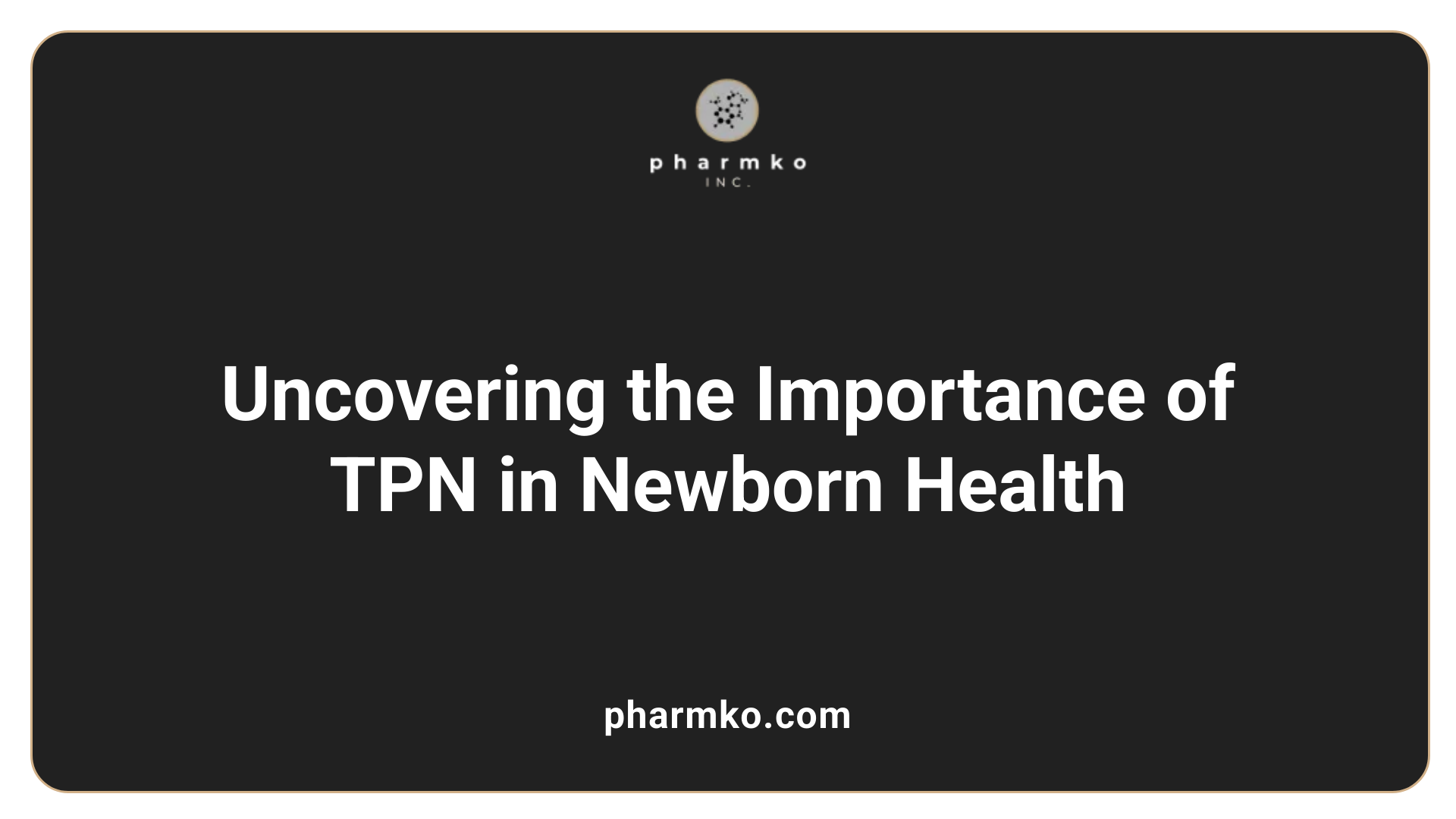How TPN Supports the Nutrition of Neonatal Patients
Introduction to TPN in Neonatal Care
Total Parenteral Nutrition (TPN) is a pivotal intervention in neonatal care, especially for premature or critically ill infants who cannot be adequately nourished through enteral feeding. By providing essential nutrients intravenously, TPN bypasses the gastrointestinal tract and ensures that neonates receive comprehensive nutritional support critical for their growth and development. Understanding TPN's role, guidelines, and potential risks is crucial for optimizing its use in neonatal intensive care units.
Understanding the Critical Role of TPN in Neonatal Care

What role does Total Parenteral Nutrition (TPN) play in neonatal patient care?
Total Parenteral Nutrition (TPN) plays a vital role in neonatal patient care by delivering essential nutrients directly into the bloodstream of infants who cannot receive adequate nutrition through enteral feeds. This method bypasses the digestive system, making it necessary for babies with impaired gastrointestinal function or those unable to feed orally or through a feeding tube. TPN is especially crucial for very premature or critically ill neonates, where proper nutrition is essential for growth and development.
A trained healthcare professional places a thin catheter into a major vein, often through the belly button, to administer TPN continuously via a pump. The hospital staff is responsible for maintaining catheter cleanliness to prevent infections and continuously monitoring the baby's vital signs. Regular blood component checks, such as glucose and electrolytes, ensure that the neonate's nutrition levels are optimal, thereby reducing complications associated with TPN.
Emotional support is also crucial; healthcare teams offer counseling for parents to help them cope with the challenges associated with their baby's condition and treatment, fostering a supportive environment essential for patient and family well-being.
What neonatal conditions require TPN?
Neonatal conditions that typically necessitate TPN include:
- Prematurity : Infants born before 32 weeks of gestation often require TPN due to their underdeveloped gastrointestinal systems.
- Gastrointestinal Disorders : Conditions like necrotizing enterocolitis and severe malabsorption syndrome require TPN to ensure proper nutrient intake.
- Surgery : Post-surgical patients may need TPN when their digestive function is impaired.
- Inadequate Oral Intake : Babies with issues such as respiratory distress or swallowing difficulties may need TPN to meet their nutritional needs.
How is TPN administered?
The administration of TPN involves placing a central line for nutrient delivery through a major vein. The solution typically includes:
- Carbohydrates (Glucose) : To provide energy.
- Proteins (Amino Acids) : Vital for growth and repair.
- Lipids (Fats) : Supply essential fatty acids.
- Electrolytes, Vitamins, and Minerals : For overall health and metabolic function.
Monitoring continues throughout the TPN administration period to adjust the formulation based on lab work and the neonate's evolving needs. Transitioning from TPN to enteral feeding is a gradual process as the infant’s condition improves and their gastrointestinal system matures.
Guidelines for Effective TPN Administration in Neonates
When to initiate TPN in neonates
Total Parenteral Nutrition (TPN) is crucial for neonates who face challenges in obtaining adequate nutrition through enteral feeding. For preterm babies, TPN should ideally be started immediately after birth if they're born before 31 weeks of gestation. For those born at or after 31 weeks, TPN is recommended if enteral feeding does not progress within the first 72 hours.
The initiation of TPN should occur as soon as the need is recognized, ideally within 8 hours. Sick newborns typically require TPN within the first day of life to prevent catabolic states, with guidelines preparing the way for support as early as possible to combat potential malnutrition.
Components and caloric requirements in TPN
TPN solutions must be tailored to meet each neonate's unique caloric and nutritional needs. The majority of infants begin with a caloric intake of at least 40 to 60 kcal/kg/day, which can be escalated to between 75 to 120 kcal/kg/day within the first four days of life.
The components of TPN include:
- Proteins (amino acids)
- Carbohydrates (dextrose)
- Lipids (fat emulsions)
For optimal growth, term infants should receive approximately 100 kcal/kg/day and 3 g/kg/day of protein, whilst preterm infants may require around 3.5 g/kg/day.
Monitoring during TPN administration
Regular monitoring is vital when administering TPN to prevent complications such as metabolic imbalances and infections. Health care providers should track blood components, particularly blood glucose and serum electrolytes, to ensure safety and effectiveness of the form nutrition.
Involvement of families in the care process also plays a significant role in the holistic development of neonates, establishing a support system crucial for their growth and recovery during hospitalization.
How TPN Enhances Growth and Health in Neonates
Nutritional benefits of TPN
Total parenteral nutrition (TPN) plays an essential role in the care of neonatal patients who face challenges in receiving adequate nutrition through conventional feeding methods. TPN is particularly important for those with congenital gastrointestinal malformations, severe gastrointestinal dysfunction, or post-surgical needs. By delivering nutrients intravenously, TPN ensures that neonates receive a balanced supply of carbohydrates, proteins, fats, vitamins, and minerals tailored to their specific growth requirements, thereby promoting optimal recovery and development.
Nutritional components of TPN
A typical TPN formulation consists of:
- Carbohydrates: Mainly dextrose, which serves as a primary energy source.
- Proteins: Amino acids essential for tissue growth and repair.
- Fats: Lipid emulsions provide essential fatty acids and additional calories.
- Trace Elements: Vital minerals and vitamins that support overall health.
The exact composition of TPN is customized based on individual patient needs, and the infusion strategy often begins with a starter solution that can evolve to accommodate changing nutritional demands as the infant stabilizes.
Impact on neonatal growth and recovery
With its carefully calibrated nutritional delivery, TPN helps combat malnutrition, a significant risk for preterm and critically ill infants. By ensuring sufficient caloric intake—typically starting at 40 to 60 kcal/kg/day and increasing gradually—TPN supports not just physical growth but also neurodevelopmental outcomes. Proper nutritional management is vital; studies indicate that optimized TPN administration can improve long-term health, diminish incidence rates of infection, and mitigate potential complications like metabolic dysfunction associated with nutritional deficiencies or excesses.
In summary, TPN is a cornerstone in neonatal intensive care, facilitating recovery in the most vulnerable patients by providing essential nutrients directly into the bloodstream.
Addressing the Potential Risks and Complications of TPN
What are the potential risks and complications of TPN in neonates?
Total parenteral nutrition (TPN) in neonates involves several potential risks and complications that healthcare providers must monitor closely. Common complications include:
- Metabolic Abnormalities : These can manifest as hypertriglyceridemia, electrolyte imbalances, and abnormal blood sugar levels.
- Liver Dysfunction : Prolonged use of TPN is associated with hepatobiliary complications, necessitating careful monitoring of liver function tests.
- Infections : Neonates on TPN often require central line IV access, which increases the risk of bloodstream infections, particularly sepsis. Studies have shown a notable incidence of infectious complications in this patient population.
Infection control and monitoring during TPN
Effective infection control measures are vital when administering TPN to neonates. Special care must be taken in maintaining central lines, including:
- Regular disinfection of insertion sites.
- Routine monitoring for signs of infection.
- Use of aseptic techniques during catheter insertion and maintenance.
Routine laboratory tests should also include:
- Blood glucose levels to monitor for hypoglycemia or hyperglycemia.
- Regular checks of serum electrolytes to avoid imbalances.
- Assessing liver enzymes to evaluate potential liver dysfunction due to prolonged TPN use.
Strategies to mitigate risks
To minimize the risks associated with TPN in neonates, several strategies can be employed:
- Tailored TPN Formulation : Individualizing TPN solutions ensures that the nutritional needs match the specific metabolic requirements of each neonate.
- Cycling TPN : When appropriate, cycling TPN can reduce the risks of liver dysfunction and metabolic complications by providing intermittent nutrient delivery.
- Close Monitoring : Routine follow-up appointments and regular monitoring of vitals and laboratory results can aid in the early detection and management of any emerging complications.
By understanding and managing these potential risks, healthcare professionals can enhance the safety and efficacy of TPN for neonates.
Implementing Evidence-Based Practices for TPN Use
What evidence-based practices are recommended for using TPN in neonatal care?
Evidence-based practices for total parenteral nutrition (TPN) in neonatal care rely heavily on established guidelines like those from ESPGHAN. These guidelines specifically address nutritional needs for preterm infants. For instance, it’s recommended that preterm infants receive a protein intake of 4.5 g/kg per day if their growth is slow. Regular monitoring of plasma urea concentrations helps assess whether protein intake is adequate.
In terms of caloric intake, preterm infants should aim for an energy level of 115 to 140 kcal/kg per day , which can be adjusted based on growth patterns. Should growth fail to meet expectations, higher caloric amounts may be necessary. Fluid and electrolyte management is also vital, particularly for very low birth weight infants, where specific guidelines on sodium and potassium intake are critical to maintain balance.
Tailoring TPN to individual neonatal needs
An important aspect of TPN practice is the individualization of nutrients . Each neonate's parenteral nutrition should be fine-tuned to their unique needs, considering factors like gestational age, weight, and any underlying medical conditions.
For instance, the formulation of TPN must include tailored doses of essential vitamins and trace elements according to the specific demands of the neonate. This customized approach helps in promoting effective growth and supports optimal neurodevelopmental outcomes.
Overview of international guidelines
International guidelines recommend initiating TPN support within the first 72 hours after birth for neonates at risk of malnutrition. Also, a gradual increase in nutrient delivery is suggested once TPN begins. Regular assessments of growth and nutritional status aid in adjusting TPN formulations.
Furthermore, specifics around monitoring blood components like glucose and electrolytes are underscored, acknowledging the risk of complications association with TPN. These comprehensive guidelines aim to ensure that neonates receive the best possible nutritional support during critical growth phases.
Conclusion
Total Parenteral Nutrition (TPN) remains an indispensable tool in neonatal intensive care, offering crucial support to infants unable to meet their nutritional requirements through enteral feeding. While it provides essential nutrients crucial for growth and development, conscientious management and adherence to guidelines are necessary to address associated risks. By tailoring TPN solutions to individual needs and implementing evidence-based practices, healthcare professionals can enhance outcomes for some of the most vulnerable patients in the NICU, ensuring that these infants receive the best possible start in life.
References
- Neonatal parenteral nutrition - NCBI Bookshelf
- TPN for Neonates - AmeriPharma® Specialty Care
- Parenteral nutrition in the NICU | Dietitians On Demand Blog
- [PDF] Neonatal Parenteral Nutrition - UCSF Benioff Children's Hospitals
- Parenteral Nutrition in the Neonatal Intensive Care Unit | NeoReviews
- Learning About Total Parenteral Nutrition in Newborns
- Total Parenteral Nutrition - StatPearls - NCBI Bookshelf
- Parenteral nutrition in premature infants - UpToDate
- Parenteral nutrition (PN) - Bliss













